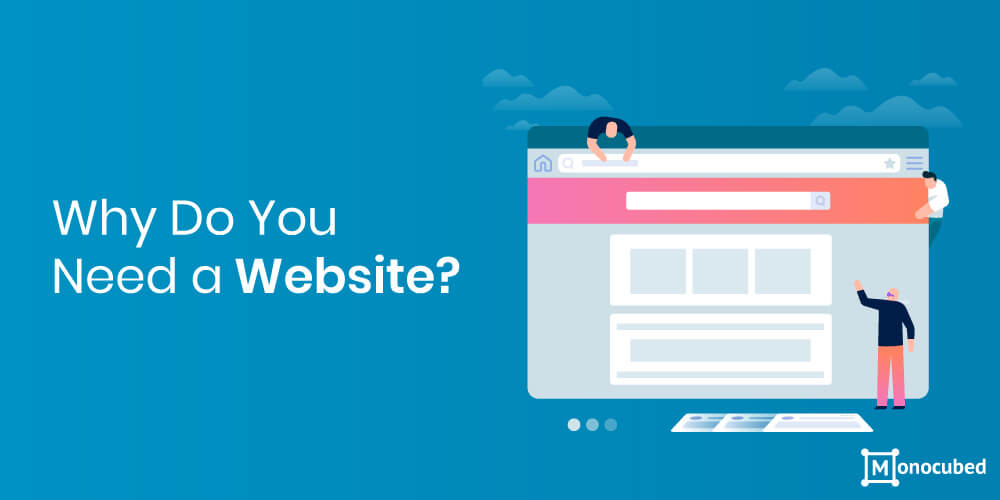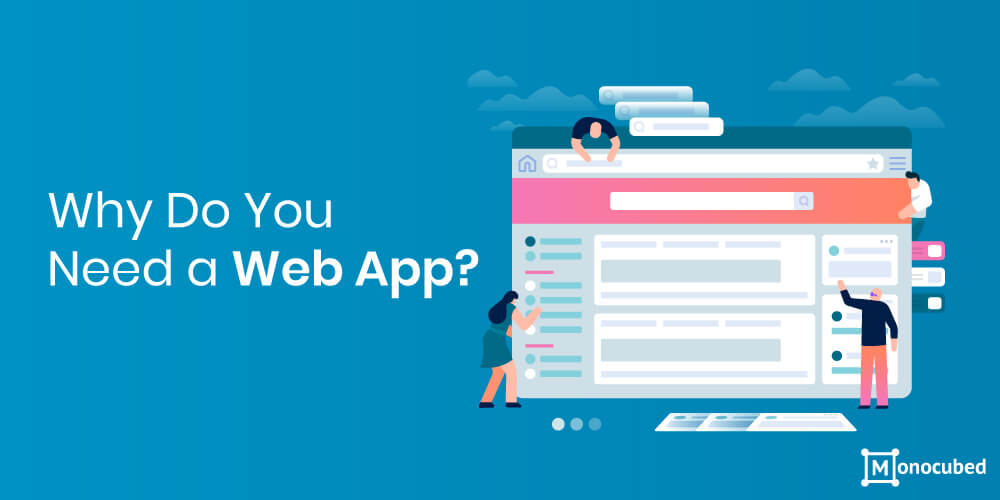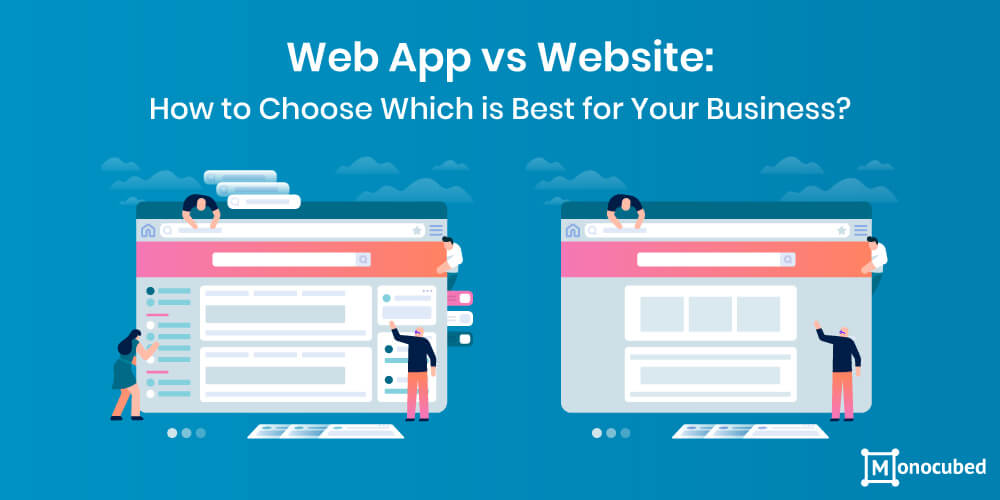When companies need to form a web presence, the common question that comes to mind is – ‘Do we need a website or web application?’ Many businesses are under the impression that anything entered in the address bar of a web browser will direct them to the desired website. But the point is, the URL address you get directed to may not be a website.
As per the user, both the terminologies seem similar because their concepts are overlapping. In order to state a website vs web app, let’s understand each of its concepts in detail. In this blog, we will look at the features of both websites and web applications along with understanding why and when to use them.
Table of Content
What is a Website?
A website is an assemblage of web pages and associated content that is recognized by a mutual domain name and issued on at least one web server. Some prominent examples are Wikipedia.org, Amazon.com, and Google.com. Every publicly available website jointly creates the World Wide Web.
There are some private websites too that can only be opened on the private area network like a company’s in-house website for its staff. Generally, websites are devoted to a certain purpose or topic, such as education, commerce, social networking, entertainment, or news site. The hyperlinking amongst pages leads to the navigation of the site, which most of the time begins with a home page.
The users can have access to websites on a variety of devices, including laptops, desktops, smartphones, and tablets. The software application utilized on such devices is known as the web browser. Websites can be categorized into two broad sections – interactive and static.
The interactive sites are a portion of the Web 2.0 community of sites and permit for interactivity between site visitors or users and the site owner. While the static sites capture the user data but do not permit user engagement directly.
Features of Website
A website is a communal application that typically targets enhancing user experience. If you or software developers are developing a website, they need to ensure that they create something that is usable and likable. Let’s understand the features that a good website must contain:
-
Browser Steadiness
The compatibility of browsers can be easily ignored. It is significant to confirm that your website behaves and appears steadily across all main browsers like Internet Explorer, Chrome, and Firefox. Simple attributes like this set a skillfully designed website apart from the rest.
-
Well-Planned Information Pattern
Strategize your website categories and sections prudently and display data in such a way that it is easy for users to search. You must always think from your users’ perspective. This is mainly vital if you propose a content repository on your website.
-
Mobile Phone Compatibility
These days more and more people utilize their phones to access the Internet. Therefore, forming a mobile enhanced website has become an inevitability. It is therefore important that your website interface is mobile-friendly, and scalable to different screen sizes and touches sensitivity.
-
Well-Formatted Content
The average user scans through content on the page instead of reading each word on the site. The users tend to skim through the key portions of the page rapidly to decide if it is appropriate as per their needs. So having better-tabulated content with a format that increases readability, your website will attract more readers.
-
Operative Navigation
Having a good navigation is one of the most essential traits of website usability. JavaScript menus or simple static HTML files work best and seem reliable on all platforms and browsers.
-
Faster Load Times
Nothing seems more annoying for any website visitor than the website that actually takes a long time to load. In reality, having a slow speed is one of the prime reasons that visitors leave the website. Make sure that your website loads within 4 to 6 seconds which is crucial for decent usability. It may also affect the search engine position.
Why Do You Need A Website?

If you need to enhance your company or business by existing in front of the right users, you have to be found online, which states that you must have a website. Below are the major reasons mentioning why you need a website:
- Building a website aids you to form a social presence
- An effective technique to display your services and products
- It allows you to escalate your customer support
- It facilitates you to attain your business objectives
- It assists you in branding your company or business
Want to Develop a Custom Website?
We’ve got you covered. Develop a custom website that works perfectly across all devices- smartphones, tablets, PCs with our experienced team.
What is a Web Application?
A web app or web application is a software application that functions on a web server, dissimilar to computer-based software lists that are preserved locally on the Operating System (OS) of any device. Web apps are retrieved by an end user through the browser with an internet connection.
Such applications are automated by using a client-server modeled construction – the consumer is supplied with the services by an off-site server that is normally hosted by a third-party. The examples of some frequently used web apps are online retail sales, web-mail, online auctions, and online banking.
Single-page apps are more app-like as they are cast-off the more classic web paradigm of moving amid different pages with dissimilar URLs. The single-page web framework might be utilized to speed up the development of a web application for the mobile platform. Web apps run inside a browser and no complex installation is required.
Web apps need slight computing power or disk space on the client and the client displays the data. Such applications resolve some of the compatibility issues and all that is required is a browser. In most of the use cases, data is preserved remotely. Additionally, with the other cloud computing, this can sanction easy cooperation and communication. It assists in mailing and communication.
Features of Web Application
A dynamic web design will help you to rationalize the process within your business and distribute information on vital analytics, which can be utilized to enhance productivity and achieve the business goals. Let’s understand the features that a good web application must contain:
-
Cross Platform
Web applications should be cross-platform so that future plans for a business remain flexible. Web apps should be able to work on different browsers, and can be developed on multiple operating systems. For example the framework. ASP.NET core is cross-platform and can run on macOS, Windows, and Linux.
This renders several new options for both the deployment and development of apps with ASP.NET Core. Docker containers both Windows and Linux that can host ASP.NET Core apps, permitting them to take advantage of microservices and containers.
-
Cloud-Hosted And Scalable
ASP.NET Core is augmented for the cloud – private cloud, public cloud, or any cloud, as it is high-throughput and low-memory. The lesser footprint of ASP.NET Core apps states that you can host more on the same hardware, and you will pay for fewer resources while utilizing ‘pay-as-you-go’ cloud hosting services.
-
Traditional And SPA Behaviors Maintained
Traditional web apps have included slight client-side behavior, but in its place have dependent on the server for all queries, navigation, and updates application. Every new procedure made by the user input would be interpreted into a novel web request with the consequence being a full page reload in the user’s browser.
The standard model view controller (MVC) framework usually follows this method, with every novel request equivalent to a dissimilar controller act, which in turn will function with the model and yield a view.
-
Simple Deployment And Development
ASP.NET Core apps can be transcribed by employing simple command-line interfaces and text editors, or a complete-featured development setting like Visual Studio. Deployments can simply be computerized to happen as a part of continuous delivery (CD) and continuous integration (CI) pipeline.
Payment Gateways
A payment gateway is a platform for authentication and processing of money transactions between your web app and your customers. Supporting various payment systems, web apps make it easy to support online payment that fits user’s preferences. It is a great choice for ecommerce applications because it combines shipping, billing information and payment methods into a single step.
Security and User Authentication
Most web apps involve a user authentication system to verify a user’s credentials. As these apps involve a higher degree of interaction and passage of user’ personal data, the layers of security involved in the development process is much more stringent and robust. Also, if the app involves some kind of monetary interaction, the security features that can be integrated into a web application are much more secure.
-
Easily Verified With Automated Tests
ASP.NET Core apps facilitate unit testing, and its loose support and coupling for dependency injection (DI) make it simple to switch infrastructure distresses with forged employments for the test purposes. ASP.NET Core also comes with a TestServer that can be utilized to host the apps in memory.
Why Do You Need a Web App?

Web apps are software designed apps used to perform on the web with specific resources. Web applications may differ from small-scale solutions to a large-scale ERP. Below are the major reasons mentioning why you need a web app:
- Web apps can be utilized on any platform – Linux, Windows, and Mac as they all support modern browsers.
- As compared to desktop applications, web apps are simpler to preserve as they utilize a similar code in the whole application. Moreover, there are no compatibility problems.
- It can be released at any time and in any form. There is no requirement to remind the development team to update their apps.
- Mobile app store consent is not obligatory in web applications.
- You can either make use of a computer or your mobile device to access the necessary data processing.
- You can easily access these web apps 24*7 from any PC.
- Web-enabled apps are internet-based apps that are retrieved through the mobile’s web browser. Consequently, you do not need to install or download them.
- Web apps are considered to be a cost-effective option for any business. Seat licenses for Desktop software are costly where Saas are normally, pay as you go.
Web App vs Website: What is The Difference?
The major difference between a Web Application and a Website is that a website is a collection of universally accessible and interwoven pages which contain a single domain name. While a web application is a program or software which is accessible utilizing any web browser. Its frontend is typically created by deploying programming languages like HTML CSS Javascript which are reinforced by the main browsers.
The backend, on the other hand, uses more resourceful languages such as PHP and Python, and sometimes JavaScript. Database systems, server configurations, testing frameworks, and other development tools are also employed in the development of both website and web applications.
The following table depicts the website vs web application in detail:
| Aspects | Website | Web Application |
|---|---|---|
| User interaction | A website facilitates text and visual content that the user can view and read, but not affect its operation. | In the web app, the user not only reads the web page content but also unfolds the restricted data. |
| Usage | The website typically contains static content. It is openly accessible to all visitors. | A web application is intended for interaction with end-users. |
| Tasks and difficulty | A website exhibits the collected information and data on a precise page. | The web application functions are fairly complex and higher as compared to websites. |
| Authentication | Authentication is not compulsory for informational sites. The users can ask to record to get a steady update or to access extra options. This feature is not obtainable for unregistered website visitors. | Web applications require user authentication as they present a much wider scope of alternatives than the web sites. |
| Deployment | Minor changes never need complete deployment and re-compilation. You are required to update HTML code. | All the changes need an entire project to be deployed and re-compiled. |
| Compilation | The site does not require to be pre-compiled. | The site needs to be pre-compiled before deployment. |
| Type of software | The website is a comprehensive product, which you can access with the assistance of the browser. | Web application development is a part of the website. It itself is not a comprehensive website. |
Examples of Websites and Web Applications
Google Docs – One of the best web applications, Google Docs allows you to create documents with live editing, real-time collaboration, multiple formats, automatic uploading on Google Drive and more.
Gmail – Another product by Google, Gmail is a single page application for email services. Apart from sending and receiving mails, you can label, sort, archive, schedule emails, make reminders, text with the integrated Hangouts app and get instant notifications.
Facebook and Instagram – Both popular social media platforms are examples of web applications. With an attractive user interface, exciting new features, multiple graphic supports, real-time chatting feature and the recent shopping market interface for new businesses to sell and market their products, they really showcase the prowess of web applications.
Websites, on the other hand, are information web pages that would include famous blog posts, educational sites, eCommerce websites, Q and A forums, service web pages, and even search engine sites.
Wikipedia, the largest repository of information on any number of topics, is a culmination of thousands of web pages into one of the most popular websites.
Google.com is the most widely used website in the world today. An extension of the Google search engine, this website employs a massive database of the internet, handling millions of user requests in a day
Youtube.com is the most popular video hosting and sharing platform on the internet. Although it has a web app, and native mobile apps, the website is still widely used and is second on the top-ranking websites list.
Have a Web App Idea?
Confused where to start? Don’t know how much it will cost? Wondering if it will be successful? We’ve got you covered. Let’s talk.
How to Decide Whether Your Business Needs A Website or Web App?
From the difference between web app and website, we can ascertain that if you run a small company and are local to your consumers, you just require a brochure website or boutique website that talks about your brand concisely, business capabilities, and location guide pointer with a map.
If you are having a popular small scale business, you need to have a tailored website for your small business to display your products or services to your end customers. If you run a local business that has a doorstep service business or a business expecting continuous customer interaction at fixed intervals, you can mechanize this process with advanced web application development services.
If you are a part of textile, manufacturing, agriculture, to reach customers, you need many software applications to function your business competently. Keeping everything together on a web application will serve an enormous benefit to your process.
There are many good Saas CRM software, ERP systems, and cloud-based BPM applications in the market to resolve business needs. Nevertheless, there are custom requirements in organizations where development assistance is needed for diverse web app systems.
Frequently Asked Questions
What is the difference between a website and web app?
A website is an assemblage of worldwide accessible, interweaved web pages which have a solitary domain name. While a web app is a program or software which is accessible utilizing a web browser. Creating your website aids you in branding your business.
What is an example of a Web application?
Web applications comprise shopping carts, online forms, spreadsheets, word processors, file scanning, file conversion, video and photo editing, and email address programs namely Gmail, AOL, and Yahoo. Popular apps are Microsoft 365 and Google Apps.
What is a web application?
A web app is a program that uses web technology and browsers to do tasks over the Internet. Its frontend is regularly developed utilizing programming languages like CSS, HTML, and Javascript, which are facilitated by chief browsers. While the back end could utilize a programming stack like LAMP and MEAN. Unlike mobile applications, there is no definite SDK for building web applications.
Conclusion
From the above website vs web app, we observe developing a website aids you in branding your business. Superiority and appropriate web content are the most critical characteristics of having a good website. Whereas, app store approval is not required in web applications. Cloud-hosted and extremely scalable apps are the most important traits of having a good web application.
While selecting between a web application and a website, keep in mind that the security level of the app needs to be great and it directly affects the budget. Contact your reliable development partner, Monocubed, if you need to build a website or want to build an app from a website. We examine and understand your business requirements and offer the best feasible solutions.
 By Jeel Patel
By Jeel Patel



